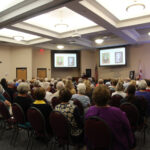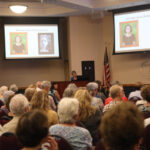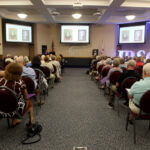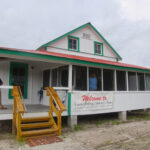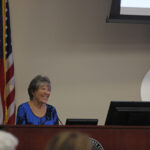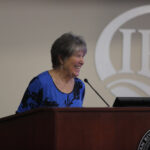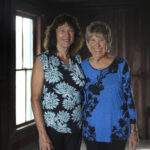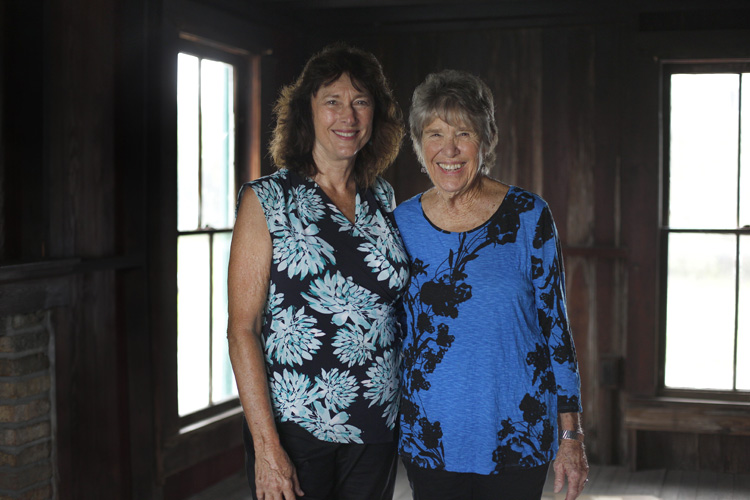
Last week was an exciting one for supporters of the Laura (Riding) Jackson Foundation. After two-plus years of monumental effort, the historic 110-year-old Florida cracker home of internationally renowned poet Laura (Riding) Jackson reaches the end of one journey and begins another. Newly situated on the Vero campus of Indian River State College, it will soon become a center of multi-generational learning in the fields of literature, history and the environment.
Originally built in Wabasso in 1910, the house was eventually moved to the Environmental Learning Center where it stood for 25 years. In 2017, the foundation learned that the homestead was not included in the ELC’s master plan and would have to be relocated.
Board members sought help from the community to save the fragile, historic structure and the response was gloriously overwhelming. Ultimately, the foundation partnered with the college, both seeing it as of great mutual benefit.
Funds were raised, plans drawn, permits obtained and, on July 14, 2019, the house, along with its associated pole barn, made the 6-mph, 12-mile journey to its new location.
Last week’s activities began Wednesday with a fundraiser at the Majestic Theatre, featuring a screening of the documentary “When We Were Apollo,” which celebrates the 50th anniversary of the Apollo 11 moon landing. The evening opened with a brilliant performance of “Age of Aquarius” by the Charter High School chorus, and post film, audience members chatted with three Apollo team members.
The attendees also met Louise Kennedy, the very first executive director of the Laura (Riding) Jackson Foundation. Kennedy, a teacher at Saint Edward’s School and a long-time supporter of LRJF, officially takes the reins next summer.
At the IRSC Richardson Center on Friday morning, Jackson’s biographer, Elizabeth Friedmann, explored “who is Laura (Riding) Jackson” via her book “A Mannered Grace.” The diminutive poet has been called a witch, megalomaniac and home-breaker, as well as one of the most gifted writers of the 20th century. Her life was equally complex, bohemian and fascinating.
Later, umbrella-wielding guests trekked across the wet sod to the house itself, which, in the gray drizzle, seemed perfectly settled as a pair of cranes calmly poked for bugs in the front yard. Among those present were several who had known Jackson.
With a smile, her attorney, Rene VanDeVoorde, recalled, “She spoke with an English accent, although she wasn’t English.”
Jackson’s long-time typist, Susan Morris, remembered the house being filled with papers and books. Morris mentioned Jackson’s utter brilliance and her crooked, awkward gait; the result of having flung herself out a second-floor window in Majorca, Spain, over a lover.
Jackson’s physician, Dr. Kathy Doner, who was present at her death in 1991, called the renewed interest in the house and the poet herself akin to “opening a treasure box.”
Casey Lunceford, IRSC Indian River County provost, credited with suggesting the college-foundation partnership, said he anticipates a growing synergy between the two.
House Preservation committee chair Jacque Jacobs, the project liaison/point person, admitted to being a bit emotional as this phase draws to a close, saying that as “a storyteller, this house has moved me deeply.”
The official grand opening and a visitors’ schedule are expected toward the end of January.
For more information, visit lauraridingjackson.org.
Photos by: Kaila Jones
Click HERE to see more or buy photos
- Biographer Elizabeth Friedmann presents a free talk at the IRSC Richardson Center about Laura Riding Jackson’s life.
- Biographer Elizabeth Friedmann presents a free talk at the IRSC Richardson Center about Laura Riding Jackson’s life.
- Biographer Elizabeth Friedmann presents a free talk at the IRSC Richardson Center about Laura Riding Jackson’s life.
- Biographer Elizabeth Friedmann presents a free talk at the IRSC Richardson Center about Laura Riding Jackson’s life.
- Biographer Elizabeth Friedmann presents a free talk at the IRSC Richardson Center about Laura Riding Jackson’s life.
- Biographer Elizabeth Friedmann presents a free talk at the IRSC Richardson Center about Laura Riding Jackson’s life.
- Dr. Kathy Doner with Biographer Elizabeth Friedmann

